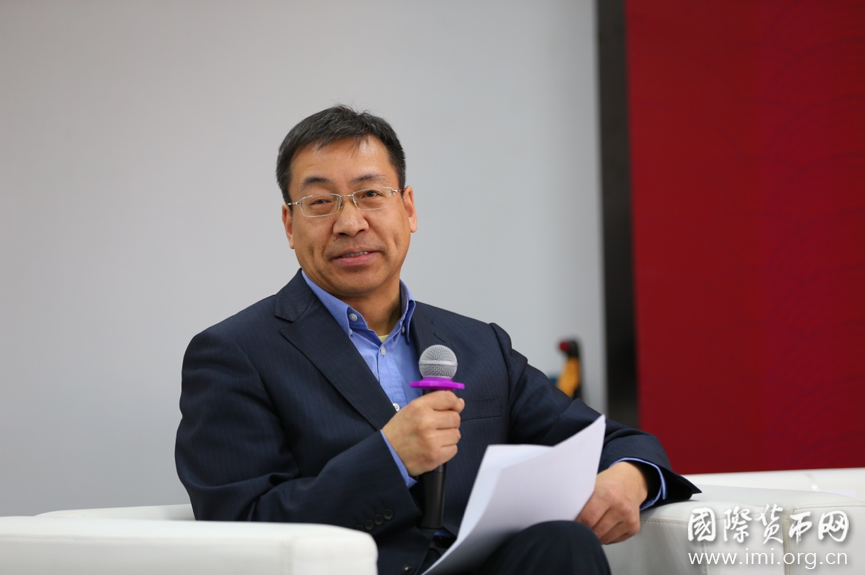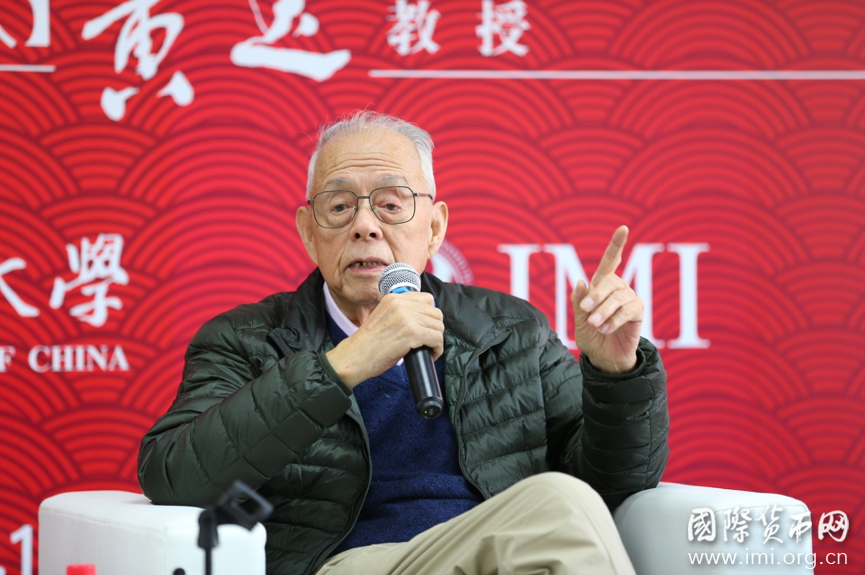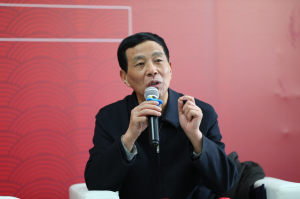Macro-Finance Salon (No. 87) and Fireside Chat on Money and Finance (No. 1): Bases Cannot Be Overemphasized
2017-12-23 IMI The salon was moderated by Zhang Jie, Director of IMI and professor in the School of Finance. In the beginning, he explained where the name “Fireside Chat on Money and Finance” derived from: a popular Confucian piece Fireside Chat (Wei Lu Ye Hua) authored by Wang Yongbin in the Qing Dynasty. The book that commented on humanity issues throughout history in a thought-provoking way boasted long-lasting and profound influence till today. IMI thus borrowed its name and initiated the Fireside Chat on Money and Finance, which is intended to invite scholars and politicians with unique insights on monetary issues to exchange perspectives and clarify the confusion of money in the society.
The salon was moderated by Zhang Jie, Director of IMI and professor in the School of Finance. In the beginning, he explained where the name “Fireside Chat on Money and Finance” derived from: a popular Confucian piece Fireside Chat (Wei Lu Ye Hua) authored by Wang Yongbin in the Qing Dynasty. The book that commented on humanity issues throughout history in a thought-provoking way boasted long-lasting and profound influence till today. IMI thus borrowed its name and initiated the Fireside Chat on Money and Finance, which is intended to invite scholars and politicians with unique insights on monetary issues to exchange perspectives and clarify the confusion of money in the society.
 Professor Huang Da’s speech touched examples through all times at home and abroad, and summarized two bases that need to be emphasized in building the financial discipline:
First, the basis of monetary and financial theory should be placed at the center. He pointed out that the general monetary and financial theory is heritage of the history and some of its most basic parts remain unchanged. The theory of money and finance in China has existed for thousands of years since its initiation in pre-Qin period while in Western Europe, the modern classical economics has made great strides since William Petty and Adam Smith. However, there was a break with previous theories, which makes it necessary to tease out the monetary and financial thought in history. Both the East and West attach great importance to money and finance, regarding them as a key tool for state governance. The relation between the real economy and financial economy should be put straight. If the financial sector is sound, economic issues can be easily resolved. Simple as the principle is, grasping it correctly is extremely difficult. Money is one of the most basic measures of all market economic activities. However, this measure is only relatively stable and never absolutely stable. The modern monetary system is organized according to the oldest monetary theory, thus always seeking institutional arrangements with lowest costs. The system is the result of repeated compromises between various economic forces in a country and the world, as well as the embodiment of credit and debt relations in one economy. A T-account can display it very well. Professor Huang said that university education must retain the basic theory and put tremendous emphasis on it, and then put forward the proposal of opening a course of “History of Financial Thought in China and Abroad”.
Second, the essence of the Chinese cultural tradition, as the basis of the basis, must be integrated into the theory of money and finance. He believes that China's political system and cultural tradition are remarkably different from those in the West. Copying the experiences of the Soviet Union, Europe and the US is not feasible. He pointed out that the character harmony (He) occupies an important status in traditional Chinese culture. The values of peace (He Ping), harmony (He Xie), gentleness (Ping He), endurance (Rong Ren), and tolerance (Kuan Rong) all stress harmony. China as the sole survivor among the four ancient civilizations should have cultural self-confidence. Despite the humiliation we suffered in modern times and the consequences of inferiority, the achievements in the past 40 years of reform and opening up have laid the foundation for the Chinese people to regain our confidence. At the same time, we should not be impetuous or conceited but practical and realistic. The traditional Chinese culture contains a wealth of economic and financial thought. Guanzi’s book The Light and Heavy Theory is a good example. We should strive to combine the essence of Chinese traditional culture with the theory of money and finance and develop a currency banking theory with Chinese features. At the end of his speech, he suggested that the School of Finance of RUC should draw on more talents in Chinese culture and traditions to do a long-term study on the fundamental theory of money and finance and further promote the construction of this discipline.
Professor Huang Da’s speech touched examples through all times at home and abroad, and summarized two bases that need to be emphasized in building the financial discipline:
First, the basis of monetary and financial theory should be placed at the center. He pointed out that the general monetary and financial theory is heritage of the history and some of its most basic parts remain unchanged. The theory of money and finance in China has existed for thousands of years since its initiation in pre-Qin period while in Western Europe, the modern classical economics has made great strides since William Petty and Adam Smith. However, there was a break with previous theories, which makes it necessary to tease out the monetary and financial thought in history. Both the East and West attach great importance to money and finance, regarding them as a key tool for state governance. The relation between the real economy and financial economy should be put straight. If the financial sector is sound, economic issues can be easily resolved. Simple as the principle is, grasping it correctly is extremely difficult. Money is one of the most basic measures of all market economic activities. However, this measure is only relatively stable and never absolutely stable. The modern monetary system is organized according to the oldest monetary theory, thus always seeking institutional arrangements with lowest costs. The system is the result of repeated compromises between various economic forces in a country and the world, as well as the embodiment of credit and debt relations in one economy. A T-account can display it very well. Professor Huang said that university education must retain the basic theory and put tremendous emphasis on it, and then put forward the proposal of opening a course of “History of Financial Thought in China and Abroad”.
Second, the essence of the Chinese cultural tradition, as the basis of the basis, must be integrated into the theory of money and finance. He believes that China's political system and cultural tradition are remarkably different from those in the West. Copying the experiences of the Soviet Union, Europe and the US is not feasible. He pointed out that the character harmony (He) occupies an important status in traditional Chinese culture. The values of peace (He Ping), harmony (He Xie), gentleness (Ping He), endurance (Rong Ren), and tolerance (Kuan Rong) all stress harmony. China as the sole survivor among the four ancient civilizations should have cultural self-confidence. Despite the humiliation we suffered in modern times and the consequences of inferiority, the achievements in the past 40 years of reform and opening up have laid the foundation for the Chinese people to regain our confidence. At the same time, we should not be impetuous or conceited but practical and realistic. The traditional Chinese culture contains a wealth of economic and financial thought. Guanzi’s book The Light and Heavy Theory is a good example. We should strive to combine the essence of Chinese traditional culture with the theory of money and finance and develop a currency banking theory with Chinese features. At the end of his speech, he suggested that the School of Finance of RUC should draw on more talents in Chinese culture and traditions to do a long-term study on the fundamental theory of money and finance and further promote the construction of this discipline.
 After the wonderful speech was an interactive discussion. Professor Zhang Jie pointed out that Professor Huang Da managed to give a 1.5-hour speech at the age of 93 with a 7-page essay for preparation. Such diligence and scholarly spirit were very touching. He said that Professor Huang transcended history in his speech and teased out historical logic of money with emphasis on the importance of the Chinese cultural tradition, giving directions for the construction of today’s finance discipline.
After the wonderful speech was an interactive discussion. Professor Zhang Jie pointed out that Professor Huang Da managed to give a 1.5-hour speech at the age of 93 with a 7-page essay for preparation. Such diligence and scholarly spirit were very touching. He said that Professor Huang transcended history in his speech and teased out historical logic of money with emphasis on the importance of the Chinese cultural tradition, giving directions for the construction of today’s finance discipline.
 Professor Wang Guangqian said that Professor Huang's speech was profound and meaningful. He quite agreed with Professor Huang's viewpoint that "Many basic theories seem simple but are hard to grasp.” and hoped that the spirit of valuing basic theories of money and finance can be carried over by generations of students.
Professor Wang Guangqian said that Professor Huang's speech was profound and meaningful. He quite agreed with Professor Huang's viewpoint that "Many basic theories seem simple but are hard to grasp.” and hoped that the spirit of valuing basic theories of money and finance can be carried over by generations of students.
 Professor Wang Guogang found Professor Huang's speech pretty enlightening. He believed study on the history of China's monetary thought is necessary. Finance originated from money and money originated from the real economy. At a time when traditional finance is revolutionized by digital currency, focusing on the fundamental principle is the key to grasp the essence of things.
Professor Wang Guogang found Professor Huang's speech pretty enlightening. He believed study on the history of China's monetary thought is necessary. Finance originated from money and money originated from the real economy. At a time when traditional finance is revolutionized by digital currency, focusing on the fundamental principle is the key to grasp the essence of things.
 Mr. Wang Yongli expressed opinions on digital currency based on Professor Huang’s speech. He believed that Bitcoin is largely mimicking the logic of gold and its value can only be reflected only when it is converted into the legal tender. He pointed out that despite the fever of Bitcoin today, we must find out the nature of money. The digital currency dominated by the central bank will not be digital currency of Bitcoin, but digitization of the legal tender system to extend and supplement the legal tender.
Mr. Wang Yongli expressed opinions on digital currency based on Professor Huang’s speech. He believed that Bitcoin is largely mimicking the logic of gold and its value can only be reflected only when it is converted into the legal tender. He pointed out that despite the fever of Bitcoin today, we must find out the nature of money. The digital currency dominated by the central bank will not be digital currency of Bitcoin, but digitization of the legal tender system to extend and supplement the legal tender.
 Mr. Wei Benhua detailed his three meetings with Professor Huang and then expressed gratitude to and respect for Professor Huang. He said he would relay the Huang’s suggestion of setting up the course of “History of Financial Thought in China and Abroad” to China Foundation for Development of Financial Education and offer his full support. He hoped that this course could soon be set up in RUC.
Mr. Wei Benhua detailed his three meetings with Professor Huang and then expressed gratitude to and respect for Professor Huang. He said he would relay the Huang’s suggestion of setting up the course of “History of Financial Thought in China and Abroad” to China Foundation for Development of Financial Education and offer his full support. He hoped that this course could soon be set up in RUC.
 Mr. Sun Guofeng believed the role of money is the most crucial behind the relationship between finance and real economy. At present, China's currency also faces some problems that need to be considered from a historical and cultural point of view. He also recalled his experience of studying Professor Huang's thoughts when he was young and applying them in actual work and research. He said Professor Huang's thought is a motivation for his further research.
Mr. Sun Guofeng believed the role of money is the most crucial behind the relationship between finance and real economy. At present, China's currency also faces some problems that need to be considered from a historical and cultural point of view. He also recalled his experience of studying Professor Huang's thoughts when he was young and applying them in actual work and research. He said Professor Huang's thought is a motivation for his further research.
 Mr. Li Bin believed that monetary policy control and related research could not be sound without a thorough understanding of the relationship between money and the real economy. But many people still have not well grasped the issue of currency creation. Emphasizing the monetary basis to think about the problems can help people master currency banking.
Mr. Li Bin believed that monetary policy control and related research could not be sound without a thorough understanding of the relationship between money and the real economy. But many people still have not well grasped the issue of currency creation. Emphasizing the monetary basis to think about the problems can help people master currency banking.
 Finally, Professor Zhuang Yumin gave her concluding remarks. She believed that though many schools in China currently have financial courses, the study of basic theories is largely neglected. The most essential part of finance is money and the monetary system. Without research based on this, the financial discipline is a tree without roots. Only by paying attention to the theoretical study of money and the monetary system can we develop a good financial discipline and provide valuable suggestions on national policies. She summed that Professor Huang's speech has two dimensions, the first money and finance and the second history and culture, and mentions two tasks, to open the course of “History of Financial Thought in China and Abroad” and to introduce talents for creation of a money and finance theory that integrates the essence of Chinese civilization. In the end, Professor Zhuang said that she would surely promote the realization of the goals and expressed sincere thanks to all guests.
Finally, Professor Zhuang Yumin gave her concluding remarks. She believed that though many schools in China currently have financial courses, the study of basic theories is largely neglected. The most essential part of finance is money and the monetary system. Without research based on this, the financial discipline is a tree without roots. Only by paying attention to the theoretical study of money and the monetary system can we develop a good financial discipline and provide valuable suggestions on national policies. She summed that Professor Huang's speech has two dimensions, the first money and finance and the second history and culture, and mentions two tasks, to open the course of “History of Financial Thought in China and Abroad” and to introduce talents for creation of a money and finance theory that integrates the essence of Chinese civilization. In the end, Professor Zhuang said that she would surely promote the realization of the goals and expressed sincere thanks to all guests.

